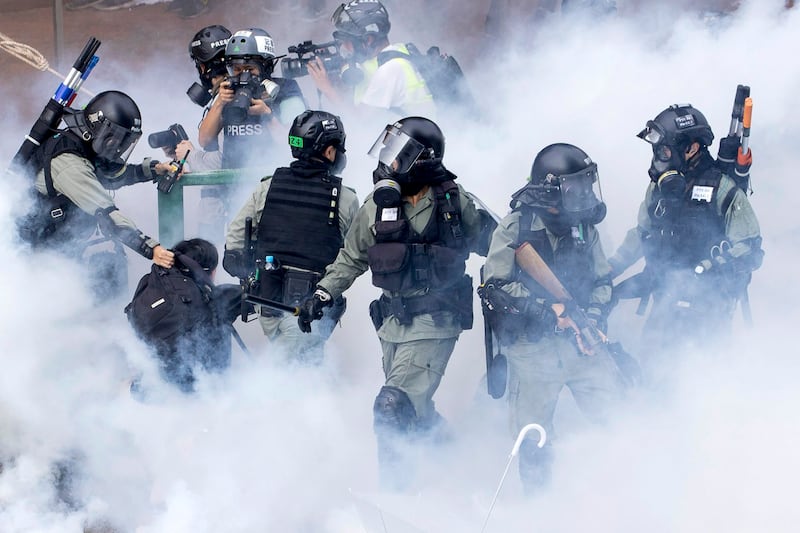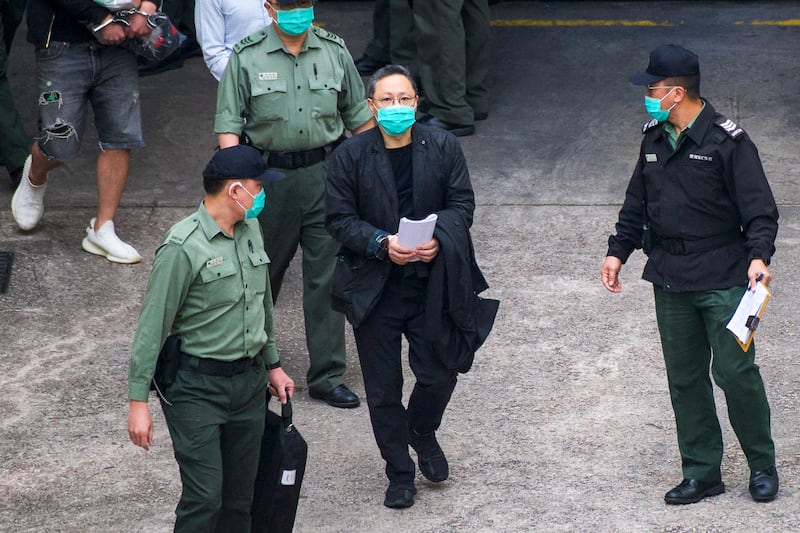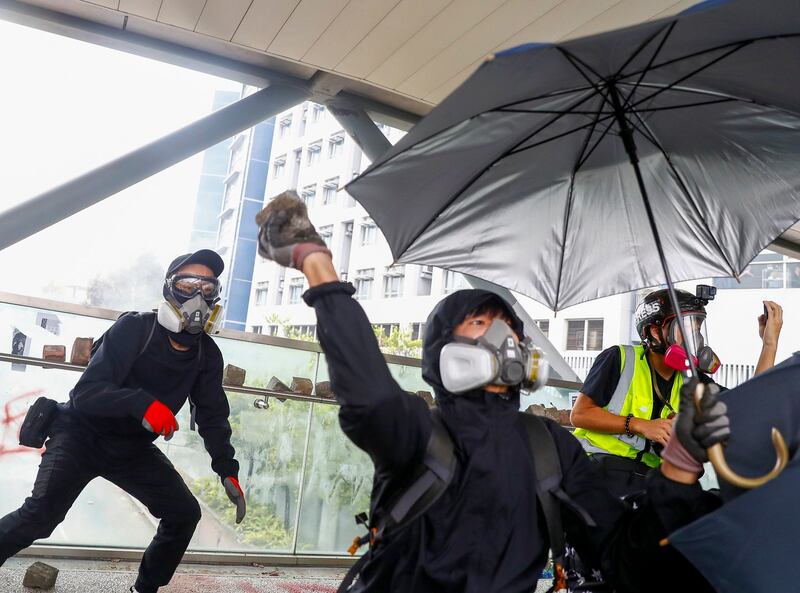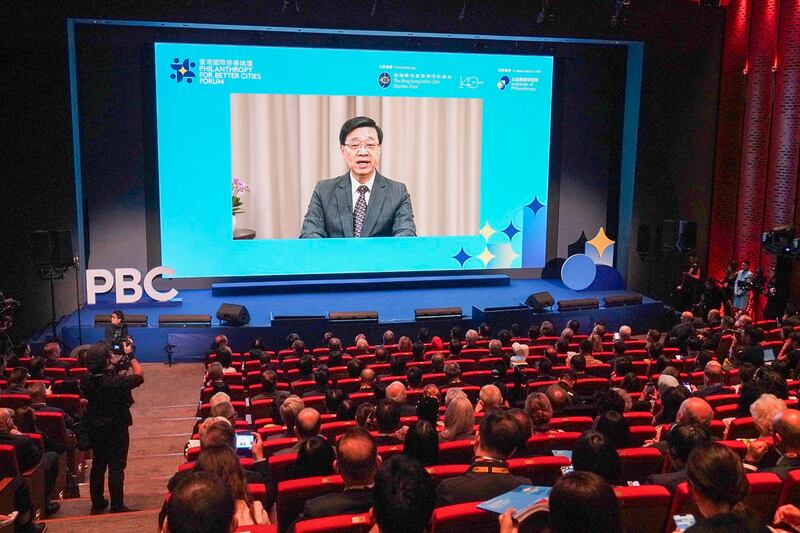Hong Kong's universities are seeing the erosion of academic freedom under an ongoing crackdown on dissent in the city, much of it in the form of self-censorship, according to a new report.
Academic freedom in Hong Kong has severely declined since the Chinese government imposed the National Security Law on the city on June 30, 2020, according to the report, which was co-authored by the New York-based group Human Rights Watch and the Hong Kong Democracy Council.
"Hong Kong students and faculty, accustomed to academic freedom, now have to tread carefully to avoid retribution for what they teach, research, and publish, and even with whom they associate,” Human Rights Watch's associate China director Maya Wang said.

The ruling Chinese Communist Party announced last year that it would step up " patriotic education" in schools, universities and religious institutions across the country, including in Hong Kong, in a move likely designed to quash internal political challenges to Xi Jinping's authoritarian rule.
Since 2020, the authorities have arrested former Hong Kong University law lecturer Benny Tai for "subversion" after he formulated a strategy to win a majority in the Legislative Council for pro-democracy lawmakers, withdrawn funding from student unions that were involved in the 2019 protest movement, and torn down pro-democracy displays on Hong Kong campuses.
Universities have also removed sculptures and other memorials marking the 1989 Tiananmen massacre, public commemoration of which is now banned in Hong Kong.
Academics have also told Radio Free Asia that university departments no longer dare to offer courses deemed politically risky, for fear of running afoul of security laws, while being obliged to offer patriotic " national security education" as a mandatory class.
‘Increasingly repressive’
The Sept. 24 report, titled "We Can't Write the Truth Anymore: Academic Freedom in Hong Kong Under the National Security Law," found that freedom of expression, assembly and association have all come under threat, as universities become "increasingly repressive."
“The Chinese government considers gaining ideological control over Hong Kong’s universities a top priority, and many students and faculty now find themselves in the line of fire," Human Rights Watch's Wang said.
Hong Kong's leader, Chief Executive John Lee, is the chancellor of all of the city's publicly funded universities, with the power to appoint key members of their government councils, which appoint senior management and staff.

Since 2020, many of those who disagreed with Beijing have lost positions of authority, while those who support the ruling Chinese Communist Party line have been rewarded, the report said.
According to the report, which was based on interviews with individuals at Hong Kong universities as well as local media reports, students and faculty widely self-censor, fearful of being targeted for harassment, retribution, and even prosecution for what they say and do both in the classroom and on campus.
Lecturers and students alike "regularly self-censor in the classrooms, when they write and publish articles, apply for academic funding, and deliberate over which speakers to invite to conferences and events," it said, adding that students, academics and administrators all felt as if they were "living under a microscope."
Censorship and suppression aren't always direct, either.
Pressure on publications
Days before the report was launched, students at Lingnan University said they had been warned off using the logo of the Lingnan University Student Union Press Bureau, with management citing concerns it could be mistaken for an official body of the school.
A recent Lingnan graduate who gave only the nickname Fern for fear of reprisals said she had once served on the Press Bureau committee, which had relied on selling merchandise like T-shirts to fund some of its publications.
"The student union doesn't give much annual funding to the editorial board, so if they can't sell merchandise, I don't know how they're going to fund their publications," Fern said.

During her time at Lingnan, Fern said management would also sometimes contact union members with "concerns" about their activities, for example, about plans to invite certain speakers to address members.
"I felt the atmosphere was very tense," she said of her time there. "It's not a place for spontaneous activism or a citizens' debate."
RELATED STORIES
[ Hong Kong officials want louder singing of national anthem in schoolsOpens in new window ]
[ Hong Kong schools ban books, warn teachers not to get 'political'Opens in new window ]
[ Hong Kong sees fall in academic freedom amid ongoing crackdownOpens in new window ]
Fewer questions, less discussion
Even off-campus activities were monitored, Fern said.
"They might call and ask students what they're planning to do and where, or maybe the national security police will call and tell them not to go ahead, as a 'reminder'," she said.
Another Hong Kong university student who asked to remain anonymous for fear of reprisals told RFA Cantonese that both students and faculty are extremely careful about what they say in public these days, for fear of being reported to the authorities.
Students also ask fewer questions in class, and there is less public academic discussion, they said.

Chung Kin-wah, a former assistant professor in social sciences at Hong Kong Polytechnic University, said the universities no longer function like places that encourage exploration and debate.
"What they're doing now isn't really a university education at all, because the universities are even suppressing the student unions ... to hound them out of existence," Chung told RFA Cantonese.
"If the student union doesn't run activities and there are no student organizations, let alone direct participation in politics," he said. "There's no room for discussion in campus politics now, which I think is a very serious issue."
Translated by Luisetta Mudie. Edited by Luisetta Mudie and Paul Eckert.
